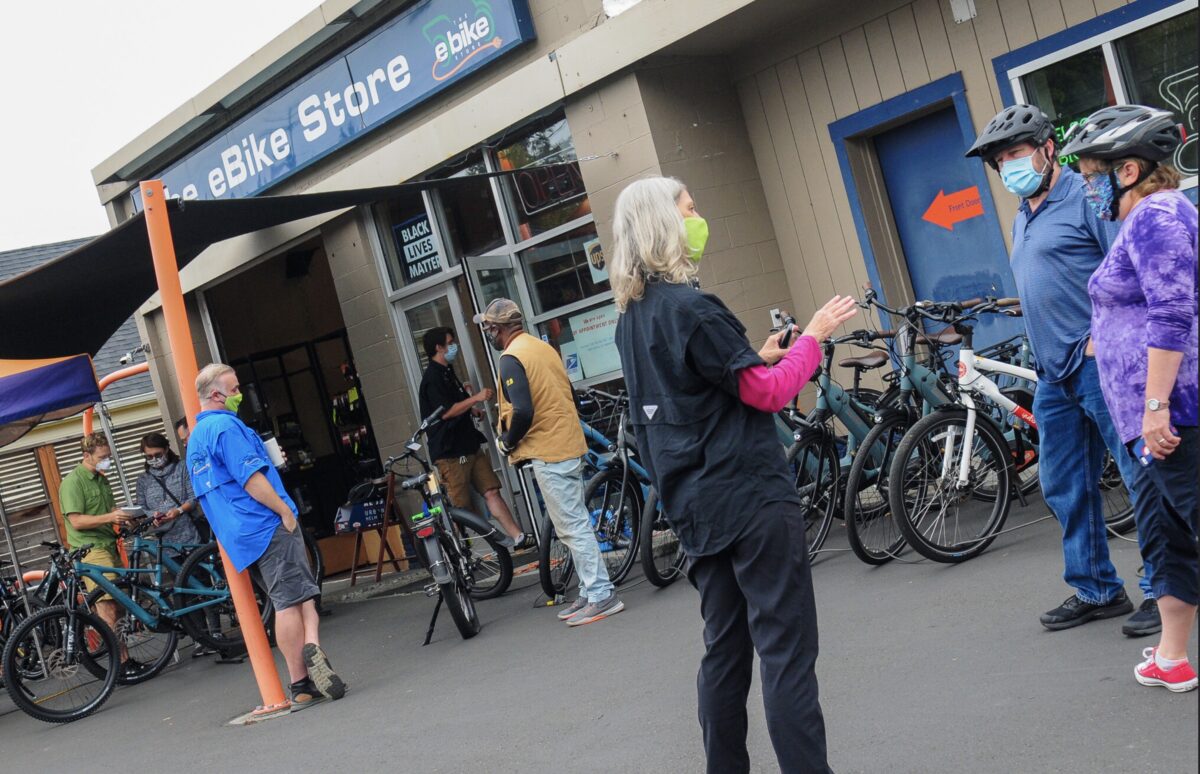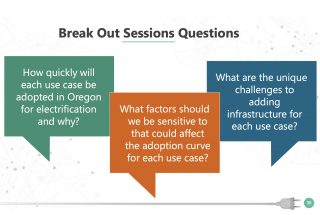
(Photo: Jonathan Maus/BikePortland)
“Our membership is focused around light vehicles.”
— Amanda Pietz, ODOT Climate Office
A State of Oregon project to study the needs and gaps of electric vehicle charging infrastructure has a gap of its own: No one on the 18-member advisory committee represents electric bicycles.
Despite thousands of e-bikes sold each year at hundreds of retail locations statewide and the skyrocketing use of e-bikes as personal vehicles by many Oregonians, the Oregon Department of Transportation has declined to add a cycling voice to the Transportation Electrification Infrastructure Needs Analysis (TEINA) project advisory group.
Advertisement
According to the project website, “Convenient, accessible charging infrastructure is a critical driver in accelerating the widespread adoption of electric vehicles (EVs) and other types of electric transportation (such as electric buses, delivery vans, freight trucks and e-bikes) and to achieve the state’s greenhouse gas emissions reduction goals.” The goal of the project is to, “Provide a near-term and long-term high-level overview of the charging infrastructure needs for other vehicle classes and use types, ranging from medium and heavy-duty trucks and buses to e-bikes and e-scooters.”
We first flagged this concern in a story about the TEINA project on December 3rd. Since then we’ve learned others have expressed frustration to ODOT about the issue but the agency has resisted requests to expand the committee.
Of the 14 advisory group members who are not government agency staff; three represent drivers and cars (AAA, General Motors, and an EV advocacy group), one is from a research firm, two are from the nonprofit sector (climate change and social justice), two are charging station product manufacturers, and six represent electric utility companies (like PGE and PacifiCorp).
Advertisement
The TEINA is being led by the ODOT Climate Office and springs from Governor Kate Brown’s executive order on climate action. That order pushes ODOT to follow Senate Bill 1044, which was passed in 2019 and set goals for the amount of registered electric vehicles and charging stations in Oregon. An implementation report for the executive order outlines ODOT’s roles and responsibilities related to the TEINA project: “Gather and analyze existing data, and describe current transportation electrification use types and vehicle classes… Compile information on factors that influence the need for charging, and the unique challenges in rural areas, urban areas, and travel corridors. Assess future potential impacts of trends and opportunities across transportation electrification use types and vehicle classes…”
Asked why no there’s no bike-specific voice on the advisory group, ODOT Climate Office Director Amanda Pietz said, “Our membership is focused on the directive of the Executive Order, which is around light vehicles.” In ODOT’s view, “electric vehicle” pertains only to electric cars — not electric bikes. This is a subjective viewpoint given that Oregon law (ORS 814.400) says, “When the term ‘vehicle’ is used the term shall be deemed to be applicable to bicycles.”
Other sources say TEINA is only about high-wattage charging infrastructure along major corridors and therefore isn’t applicable to bicycle use. That framing marginalizes e-bikes from the outset, assumes e-bike users don’t want to go long distances (they would if they could count on publicly-accessible charging stations), and creates an unfair playing field for car users.
With this driving and car-centric framing, the TEINA process shoves bikes over into the margins along with e-scooters, bike share systems (“micro-mobility”), buses, and freight trucks. At the second (of four) TEINA advisory group meetings on Tuesday, a presentation (PDF) shared nine electrification use-cases. It included things like urban and rural “light duty vehicles,” “long haul trucking”, and “micro-mobility”. The presentation also included maps and data about where EV chargers are currently located. The use of personal e-bikes was not among the use-cases and there was no mention of charging locations for e-bike use (beyond micro-mobility which is a completely separate use-case).
Pietz assured me that the TEINA effort is “very preliminary”, that there’s more work to follow and, “the interest in supporting an e-bike future is there.” Pietz added that forthcoming focus groups will include input from e-bike advocates.
Advertisement

(Source: ODOT presentation)
Without a seat at the main table there’s a real risk this report will miss a crucial element of Oregon’s electric transportation future. The saying, “What you don’t measure doesn’t count,” seems to apply here.
Phillip Ross is director of sales and marketing at B-Line Sustainable Urban Delivery, a last-mile freight and logistics company based in Portland. The company has been in business for 12 years and runs a fleet of 12 electric and pedal-assisted cargo trikes out of a central eastside hub. In 2020 the company made 16,544 deliveries from 197 vendors. Ross has also been attending monthly meetings of the nascent “E Bikes for All” group convened by Forth, an electric vehicle advocacy nonprofit. The TEINA project was discussed at their meeting Thursday morning.
Reached after the meeting, Ross said, “It disappoints me that ODOT has not offered a seat at the table for so many voices that represent the community at large when planning such consequential projects… Without a seat at the table the elected officials and policymakers that rely on ODOT’s guidance for making smart transportation policy are flying blind.”
Wake Gregg, owner of The EBike Store in north Portland, agreed. “E-bikes and cycling in general need to be represented at all critical ODOT infrastructure meetings. Why would they exclude the most efficient form of motorized transportation?”
— Jonathan Maus: (503) 706-8804, @jonathan_maus on Twitter and jonathan@bikeportland.org
— Get our headlines delivered to your inbox.
— Support this independent community media outlet with a one-time contribution or monthly subscription.


